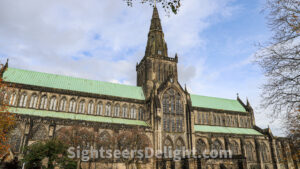Glasgow Cathedral, known as Cathair-eaglais Ghlaschu in Scottish Gaelic, is a historic parish church in Glasgow, Scotland, that belongs to the Church of Scotland. It is considered the oldest cathedral in mainland Scotland and the oldest building in Glasgow. The cathedral was once the seat of the Archbishop of Glasgow and, until the Scottish Reformation in the 16th century, it served as the mother church of the Archdiocese of Glasgow and the Province of Glasgow. The Bishop’s Castle, built in medieval times, once stood west of the cathedral until the 18th century. Saint Mungo, the patron saint of Glasgow, is honored at the cathedral, and his tomb lies in the Lower Church at the center of the building. The first stone cathedral was dedicated to Saint Mungo in 1136 in the presence of David I, and fragments of this structure have been found beneath the current cathedral, which was dedicated in 1197. The cathedral underwent significant rebuilding in the 13th century, and the University of Glasgow held its first classes in the cathedral’s chapter house after it was founded in 1451. Following the Reformation, the cathedral was partitioned to accommodate three separate congregations. However, in the early 19th century, there was a growing appreciation for the cathedral’s medieval architecture. Glasgow Cathedral has been Crown property since 1587 and under the state’s care since 1857. Today, it is the responsibility of Historic Environment Scotland, and the congregation is part of the Church of Scotland’s Presbytery of Glasgow.
Glasgow Cathedral
Type of Attraction
Description

